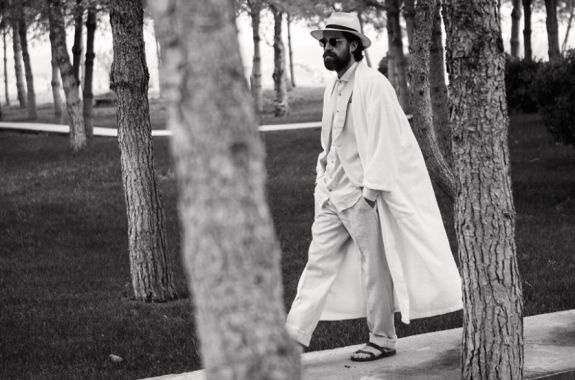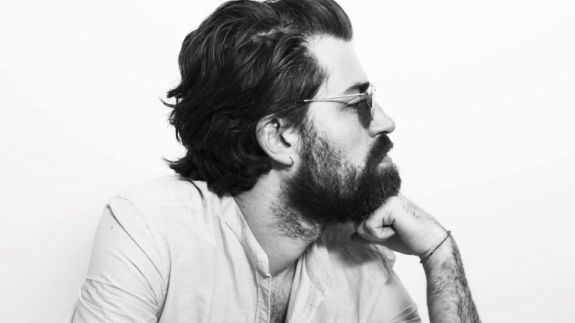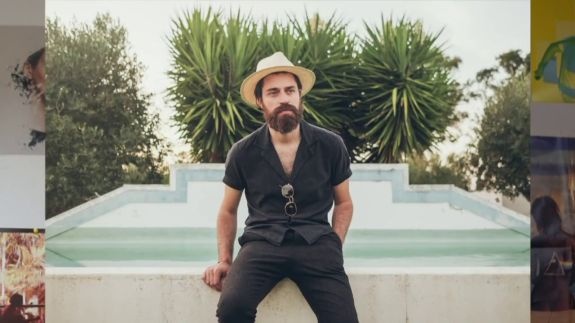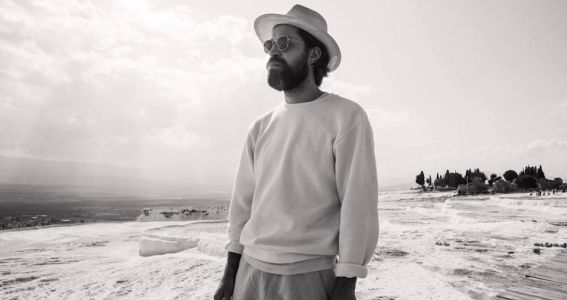SCROLL DOWN FOR ENGLISH VERSION
---ITA---
Ciao Jinte e benvenuto su SpazioRock! Il 2 maggio ti esibirai per la prima volta a Milano con il tuo progetto solista. Cosa ti aspetti dal pubblico italiano e qual è il tuo rapporto con l'Italia?
Beh, sono già stato in Italia con la mia altra band, i Balthazar. Abbiamo suonato a Milano, in un locale molto grande, il Fabrique, e anche un paio di volte a Bologna. So che gli italiani sono molto entusiasti, c'è sempre un'accoglienza calorosa e amo l'Italia come paese.
C'è qualcosa che ti piace della musica italiana?
Beh, non so molto della musica italiana a essere onesti. Tuttavia, conosco bene Pavarotti naturalmente! Considero la musica italiana drammatica. Passionale è probabilmente l'attributo migliore per descriverla. È una buona cosa.
J. Bernardt è un nom de plumme molto originale. Quali sono le ragioni di questa scelta? Perché non solo Jinte Deprez?
Perché nessuno può pronunciare il mio nome esatto, Jinte Deprez! È un po' troppo difficile. Inoltre, non volevo utilizzarlo perché si tratta di un progetto parallelo. Voglio dire, è solo un altro lato di me, non la mia intera sostanza. Bernardt è il mio quarto nome, quindi mi appartiene tutto sommato, mentre J è solo la versione abbreviata per Jinte. Sono Jinte Deprez quando vado in negozio a comprare generi alimentari, ma volevo qualcosa di diverso per salire sul palco.
Parliamo della tua prima uscita con questo progetto, "Running Days", che ha ricevuto un ottimo riscontro. Ti aspettavi un debutto così positivo? E cosa ti ha spinto a iniziare una carriera parallela da solista?
No, non mi aspettavo nulla, in realtà. Volevo solo realizzare della musica un po' diversa da quella che ho fatto con la mia altra band. Questo è il motivo per cui ho iniziato questo progetto solista. Siamo stati in tour senza sosta scrivendo album... Avevo solo bisogno di qualcos'altro: un progetto solista per costruire qualcosa di meno rock. Ho iniziato da solo, nella mia stanza, giocando e scherzando un po' con sintetizzatori, ritmi e così via. Poi è cresciuto come un disco e l'ho realizzato per me stesso. Mi è piaciuto molto farlo, sai... solo per divertimento (ride, ndr.). Non sapevo cosa aspettarmi... In un certo senso, speravo che alla gente sarebbe piaciuto, ovviamente, ma non era la mia principale ambizione. La mia principale ambizione era semplicemente divertirmi, perché con i Balthazar devi solo fare buoni album e cose del genere. È stato proprio come: "Sì, posso fare qualunque cosa. A nessuno importa". Ora che l'ho appena pubblicato e alla gente è piaciuto, è cool ed è divertente sentirlo.

Molteplici influenze sono riconoscibili nel tuo sound, dai Kraftwerk all'R&B. Che cosa hai assorbito dalle tue band preferite e come sei riuscito a incorporare queste influenze nel tuo sound?
Beh, non ci ho pensato a dire il vero. Ho soltanto scritto le canzoni. Sono un classico cantautore, quindi gradisco avvicinarmi alla musica con una chitarra o un pianoforte, ma questa volta sono partito dal groove, dapprima con la batteria, poi ho iniziato a suonare con i sintetizzatori. Il mio obiettivo non era quello di creare dei brani simili a quelli dei Kraftwerk; il nuovo materiale rappresenta ciò che è venuto fuori naturalmente dal processo di scrittura. Tutto è un'influenza per me, solo in seguito ho notato che c'è davvero dell'R&B oltre a molti elementi soul, ma non ci ho pensato in anticipo. Non è che debba riflettere a come incorporare le cose, l'ho semplicemente lasciato accadere: ho soltanto creato un sacco di musica.
La title track ha un ritmo che cresce, direi quasi orchestrale. Possiamo considerare la canzone quella che meglio riassume l'intero album? E come è nata?
In realtà è una canzone semplice, solo quattro accordi. Credo che il groove sia davvero importante: c'è un completo equilibrio dal sapore particolare ed R&B. Per me quello era un connubio perfetto. Non volevo fare, sai, musica emotiva o semplice musica da ballare. Volevo combinare entrambe le cose, dunque la traccia ne è un esempio perfetto, una classica ballata da cantautore. È molto ballabile. È anche molto groovy e ha parecchio feeling R & B. Quindi, quando ho trovato questa mescolanza, ho pensato che fosse l'ideale per quello che volevo fare. C'è molto spazio per l'intimità mentre balli, ma all'inizio non c'è tanta musica, quindi posso cantare la mia storia personale, sai? Certo, è bello lasciarla crescere. Voglio dire, alla fine ci sono i corni e le trombe che la trasformano in qualcosa di maestoso e gioioso. Per me era fondamentale sentire di poter fare tutto con elementi semplici, perché è solo groove e un paio di strumenti. Molte delle cose che sono programmate al giorno d'oggi non sono molto dinamiche. Sei abbastanza limitato in quella zona. Quella traccia invece è un bell'esempio di come si può essere molto dinamici anche con un sottofondo elettronico.
"The Other Man" possiede molti riferimenti a suoni orientali mescolati insieme grazie a un uso intelligente della tecnologia. Sei personalmente affascinato da culture lontane? E come le metti in relazione con la musica occidentale?
Sono d'accordo, c'è qualcosa di interessante su "The Other Man". C'è molto groove basato sui loop. La musica occidentale è più melodica, quindi quando guardo a quel tipo di approccio penso più all'Africa o all'India: un insieme di loop pulsanti e molto ritmici. Poi, alla fine, in realtà, impiego lo stesso trucco. Uso i corni e tutto il resto. Quindi, penso che il risultato sia più melodico. Per me quella canzone e la maggior parte dei brani dell'album sono il tentativo di mescolare altre culture alla musica occidentale, perché sono cresciuto con quella. Come ho detto, sono un classico cantautore nato con i Beatles. Dunque ho pensato fosse interessante celebrare un matrimonio tra questi loop. Aggiungere alcui elementi classici di songwriting, o corni, aiuta a rendere tutto molto musicale.
Penso che l'album ricordi alcuni aspetti del suono degli anni '90. Un esempio è la ballabile "Wicked Streets"... sei forse d'accordo?
Beh, non lo so. Gli anni '90 sono il periodo della mia infanzia. Voglio dire, è così che funziona la musica... torni sempre alle prime influenze. Non saprei se il mio sound si avvicini a quello degli anni '90. Penso che siano i gruppi R&B degli anni '90 o qualcosa del genere ad avermi influenzato in questo senso. Ma non lo so... Quindi credo di averne solamente nostalgia. Volevo sentirmi di nuovo un ragazzino.
Sul disco, c'è un uso della voce quasi blues. Come hai lavorato al canto per questo disco?
Oh sì, adoro il blues. Con i Balthazar canto in modo più melodico, intendo più come un normale cantante in una band indie pop. Per questo album invece volevo provare qualcosa di diverso, perché quando scrivi più musica R&B devi cantare in maniera più ritmica. Voglio dire, non puoi cantare su di esso in modo troppo pop. O non volevo. In realtà, non stavo cercando il blues, ma penso più il soul. Ho ascoltato un sacco di blues e soul mentre stavo scrivendo l'album e questo è il mio modo preferito di cantare. È credibile e soprattutto è onesto. Volevo fare un disco onesto, e il blues e il soul lo sono sempre.

Alcuni mesi fa è stato pubblicato il remix di alcuni brani di "Running Days" con la partecipazione di altri artisti. Cosa puoi dirci di questo progetto?
Beh, in realtà non so molto dei remix, ma mi piace l'idea. Soprattutto ora, perché la mia musica non è così buona per un club al giorno d'oggi. Quindi, è bello donarla a qualcuno e riceverla come copertina, come una nuova interpretazione. Io scrivo la canzone e so di cosa tratta, ma poi è bello vedere che qualcun altro la rielabora in qualcosa di completamente diverso. Penso che i cinque remix presenti siano i più belli. Ad essere onesti, sono positivamente sorpreso da ciò che ha fatto Henrik Schwarz. Ne ha fatto un brano totalmente differente. È bello vedere il tuo lavoro avere una seconda vita attraverso qualcun altro. Hanno preso una canzone e ne hanno fatto la loro versione. Non è che ero seduto accanto a loro o qualcosa del genere. Ho solo consegnato le tracce.
Quali sono i tuoi progetti futuri con J. Bernardt e con Balthazar?
Ora sto scrivendo alcune nuove canzoni con J. Bernardt per il prossimo tour. Ho intenzione di smettere di suonare con J. Bernardt dopo quest'estate, perché sto anche lavorando al prossimo album dei Balthazar per il quale siamo ora in studio. Penso che verrà pubblicato alla fine dell'anno o in autunno. Ora suonerò gli ultimi concerti con J. Bernardt e poi comincerò con i Balthazar per il quarto album, poi vedremo. Non so cosa farò dopo. Forse un altro disco con i Balthazar, o un altro nuovo album di J. Bernardt.
Grazie per questa intervista: potresti lasciare un messaggio ai nostri lettori e ai tuoi fan?
Si. Grazie per avermi chiamato. Non vedo l'ora di suonare a Milano. Spero davvero che molte persone verranno a vedere il mio spettacolo, perché credo che sarà davvero bello. Possiamo ballare e cantare insieme. Voglio dire, è questa la musica, no? Quindi, mi auguro che tanti si uniscano a noi quella sera.
---ENG---
Hi Jinte and welcome to SpazioRock! On the May 2nd you will be performing in Milan for the first time with your solo project. What do you expect from the Italian audience, and what is your relationship with Italy?
Well, I've been to Italy before with my other band, Balthazar. We played in Milan, at a very big venue, the Fabrique, and also a couple of times in Bologna. I know Italian people are very enthusiastic, there's always a very warm welcome, and I love Italy as a country.
Is there anything you like about Italian music?
Well, I don't know a lot about Italian music to be honest. However, I do know Pavarotti of course! I consider Italian music dramatic. Well, passionate is probably the best attribute to describe it. That's a good thing.
J. Bernardt is a very original nom de plume. What are the reason for this choice? Why not just Jinte Deprez?
Because nobody can pronounce my normal name, Jinte Deprez! It's a little bit too difficult. Moreover, I didn't want to use my own name because this is just a side project. I mean, it's just another side of me, not my whole truth. Bernardt is my fourth name, so it's also my name in a way whereas the J is just the short version for Jinte. So in a way this is my name, but a little bit different. I'm Jinte Deprez when I go to the shop to buy groceries but I wanted a different name for when I am on stage.
Let's talk about your first release with this project, "Running Days", which has received a very good feedback. Did you expect such a positive debut? And what motivated you to begin a parallel solo career?
No, I didn't expect anything, actually. I just wanted to make some music that was a little bit different from what I have been making with my other band. This is the reason why I started this solo project. We've been touring non-stop and making albums... I just needed something else: a solo project to do something less rock. It started on my own, in my room, playing and fooling around a bit with synthesizers and beats and such. Then it grew as an album and I made it for myself. I really enjoyed doing it, you know... just for fun (laugh, Ed.). I didn't know what to expect... In a way, I hoped that people would have liked it, of course, but that wasn't my main ambition. My main ambition was just to have some fun on the side, because with Balthazar, you have to make good albums and such. This, it was just like: "Yeah, I can do whatever. Nobody cares." Now that I have just released it and people kind of liked it, it's cool. It's fun to feel that.
Multiple influences are recognizable in your sound, from Kraftwerk to R&B. What have you absorbed from your favorite bands and how did you manage to incorporate these influences into your sound?
Well, sure, I just didn't really think about it. I just made the songs. I'm a classic singer-songwriter, so normally, I like approaching music on a guitar or a piano, but this time I started from the groove. I made a lot of drum grooves and started playing with synthesizers. My goal wasn't to make a Kraftwerk song, the new material is just what came naturally out of this songwriting process. Everything is an influence to me, it's just afterwards that I noticed that there is some R&B indeed. There's a lot of soul influences as well but I didn't think about it in advance. It's not that I have to think about how to incorporate stuff, I just let it happen. I just made a lot of music and that's what came out of me.

The title track has a rhythm that grows, I would say almost orchestral. Can we considered that song the one that best summarizes the whole album? And how was it born?
Actually, it's a simple song, a four chords one. I think the groove is very important, it has a full balance with a strange and R&B groove. To me, that was a perfect marriage. I didn't want to make, you know, emotional music or a stupid groove dance music. I wanted to combine both, so in that way, this track is a perfect example of a song, a classic singer-songwriter ballad. It's very danceable. It's very groovy as well and it has a lot of R&B feel to it because of that. So, when I found that combination I thought it was ideal for what I wanted to do. There's a lot of space for intimacy, in a way, while you dance, but there's not a lot of music going on in the beginning, so I can sing my personal story, you know? Of course, it's nice to let it grow. I mean, in the end there are horns and trumpets that turn it into something majestic and joyful. For me, it was important that I could feel that I could do everything with simple elements, because in a way it's just a groove and a song with just couple of instruments. A lot of the stuff that's programmed nowadays doesn't feel very dynamic. You're pretty restricted in that area. That track instead is a nice example of how you can be very dynamic with an electronic underflow too.
"The Other Man" has many references to oriental sounds mixed together thanks to a smart use of technology. Are you personally fascinated by faraway cultures? And how do you relate them with Western music?
I agree, there is something interesting about "The Other Man". It's very much loop-based groove. Western music is more melodic so when I am looking into that kind of loop-based approach I think more about Africa or India. These kinds of music are very pulsing and have very rhythmical loops. Then, in the end, I do the same trick, actually. I use horns and everything. So, I think the result it's more melodic. To me that song and actually most of the songs on the album are my attempt to mix some other cultures into Western music, because I grew up with that. Like I said, I'm a classic singer-songwriter born with The Beatles and everything. So in a way, I thought it was interesting to make songs just on a groove and loop it, and then find a marriage between those loops. Adding some classic songwriting stuff, or horns, helps in making it very musical.
I think the album recalls some aspects of the '90s sound. An example is the danceable "Wicked Streets"... do you possibly agree?
Well, I don't know. The '90s is my childhood era. I mean, that's how music works... you always go back to early influences. I wouldn't know how I sound '90s. I think what makes me '90s sometimes is the '90s R&B groups or something. But I don't know... So I think I just was nostalgic about it. I wanted to feel a kid again.
On the record there is a use of a voice which is almost blues in a way. How did you work on the singing for this record?
Oh, yeah. Well, I love the blues. With my other band, I sing way more melodic, I mean more like a normal singer in a indie pop band. For this album instead I wanted to try something different, because when you write more R&B stuff you have to sing more rhythmical. I mean, you can't sing very poppy on it. Or, I didn't want to. Actually, I wasn't looking for bluesy, but I think more soul. I listened to a lot of blues and soul while I was making the album and that's my favorite way of singing. It's credible and especially it's honest. I wanted to make an honest record, and blues and soul are always very honest and subtle.
A few months ago the remix of some tracks of "Running Days" was released with the participation of other artists. What can you tell us about this project?
Well, actually I don't know a lot about remixes but I kind of like the idea. Especially now, because my music is not that good for a club nowadays. So, it's nice to just give it to somebody and receiving it back as a cover, like a new interpretation. I make the song and I know what the song is about but then it's nice to see that somebody else just reworks it to a totally different song. I think the five remixes that are on there are the nicest ones. To be honest I am positively surprised by what Henrik Schwarz made. He made a totally different song out of it. It's nice to see your own work having a second life through somebody else. They've just got the song and they made their own version of it. It's not that I was sitting next to them or something. I just delivered the tracks.
What are your future plans with J. Bernardt and with Balthazar?
Now I'm making some new songs with J. Bernardt for the upcoming tour. I'm going to stop playing with J. Bernardt after this summer, because I'm also working on the next Balthazar album for which we are in the studio now. I think that's going to be released at the end of the year or in autumn. Now, I'm going to just play the last concerts with J. Bernardt and then start with Balthazar again for the fourth album, and we'll see. I don't know what I'm going to do after that. Maybe another Balthazar, one more new J. Bernardt album.
Thank you for this interview, and can you leave a message for our readers and your fan?
Yeah. Thank you for calling me. I'm looking forward to play in Milano. I sure do hope that a lot of people are going to come to see my show, because I think it's going to be really cool. We can dance and sing together. I mean, that's what music is about, no? So, I hope a lot of people will join us that evening.

